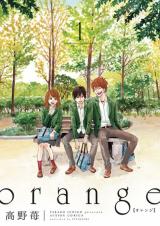This is a quality manga; this is one that has a good probability of tugging at your heartstrings.
This really deserves a longer review. I'm at a stage of my life in which I can no longer really spend the time on on a detailed breakdown. Fortunately, lots of longer reviews here. I figured I would just do some part to contribute some more words on MU. MU never die! Manga reviews are spread thin now across here, AniList, MyAnimeList, Good Reads, etc., but MU 100% is still the best database for manga.
Alright, I suppose I should move onto my brief thoughts about Orange.
What I did not like:
-The series really did not need an expository explanation for its time travel mechanism. Time travel always gets much lamer when talk of parallel universes, paradoxes, and physics gets more than a brief mention. The ultimate explanation for how the group achieves their time travel in
guessing correctly that there was a black hole in the Bermuda triangle
was so hokey that it momentarily jarred me out of a really moving part of the story. If you are working on a time travel story in which the science of the time travel is not directly related to the plot, please, your characters don't need to actually cite physics technobabble. They can just be confused and accept that miracles are happening. (Also, see Netflix's Dark for another example of poorly handled time travel exposition that distracts and weighs down the story with nonsense.)
-Kakeru and Naho could have used a few more character quirks. The series could have also fleshed out Ueda a little bit more. It seemed like she was also in a bad mental place.
What I did like:
+Sadness, ruminating regret, and familial depression are fortunately handled in a much more sensitive and measured manner than the time travel mechanism, which is obviously much better than if vice versa were the case. This series will stick with me because of how grounded and sensible Kakeru's struggle with his mental health felt. It felt so real that Kakeru kept having setbacks, that his friends had to strive so fervently for Kakeru to be able to realize small improvements. It also felt much more lifelike that the series did not culminate with Kakeru being ultimately cured. Yes, the group is able to change the future and
Kakeru opts to not throw himself in front of a vehicle at that particular moment in time, but it is clear that Kakeru's struggle has not neatly come to an end. He is dealing with an affliction that will likely crop up in episodes throughout the rest of his life
.
+Especially in the last volume, I think the series beautifully delivers the wisdom that we will always have regrets and demons to work through. And ultimately, who is to say that one future is better than the other?
It was profoundly sad in the panels close to the end where the friends ask Suwa whether he is okay with a future in which he does not marry Naho and have a child with her; Ichigo Takano drew a memorable expression for Suwa that exuded wistfulness and uncertainty.
Will read Orange Future soon to see if it provides a nice coda. For the time being, I will wrap up by saying that Orange concluded with a feel-good warmth that felt earned through the hard work of friendship and love. It was not saccharine. The pacing was well done and the characters had believable arcs. This is a rewarding, life-affirming work.
Love and cherish your friends, people.






